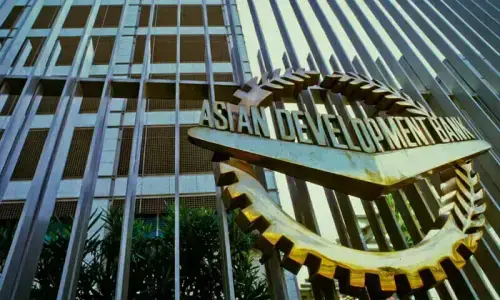ALL eyes are once again fixed on Pakistan, the centre of gravity for insurgencies in several parts of the region, as a peace broker in Afghanistan. As government and Afghan Taliban representatives convene for a second round of talks on Friday, some confidence-building measures (CBMs), including a possible ceasefire, are high on the agenda.
In fact, the Afghan government had broached an immediate truce at Murree on July 7. The response from Taliban interlocutors, who had agreed to cease fire if Pakistan and China guaranteed the creation of a broad-based government in Kabul, offered some cause for cautious optimism.
Both Islamabad and Beijing are ready to go the extra mile if the parties involved green-light their role in a comprehensive settlement. The facilitators of the process, while gingerly paving the way for progress towards ending the conflict, will obviously eschew dictating terms to the parties.
Pakistan can infuse legitimacy into the Afghan peace process.
Instead, they have astutely pushed the ball into the court of representatives from the two sides to chart their way to a truce — a CBM that will help contain the ongoing Taliban onslaught in several provinces of Afghanistan. The relentless summer offensive has seen the fall of some districts and the mass surrender of Afghan security personnel.
Days before the meeting, the Taliban took control of a large police base in Tirgaran, Warduj district in north-eastern Badakhshan province after the surrender of around 120 policemen and border guards. The loss of the base and that of Kohistanat district in Sar-i-Pul province acutely highlighted the limitations of Afghan security forces.
However, there has been a groundswell of support for Afghan-led reconciliation in the build-up to the resumption of the 2+2+1 process, with Saudi Arabia hosting a clandestine meeting between a two-member Taliban team and Afghan officials. Members of the Taliban’s Qatar office and Pakistani officials also attended the talks, arranged at Islamabad’s request.
Delegates from both parties were invited soon after the groundbreaking Murree initiative to the oil-rich kingdom, where detailed discussions on the peace process took place. Pakistan’s Arab allies including Qatar also seem to be supportive of the effort backed by the mainstream insurgent faction.
Although Afghan negotiators indicated earlier in the month that the venue will shift to Urumqi, odds are that they will meet again in Murree on July 31. Pakistani diplomats, characterising the previous encounter as a small step, insist they want to transform it into a result-oriented and deeper engagement.
On the face of it, Taliban supremo Mullah Omar’s nuanced Eid message plainly set out his position on jihad, the rights of minorities, modern-day education, the legitimacy of political means and peaceful pathways for achieving goals. His mention of the Qatar political office, which has been mandated to discuss issues with Afghan and foreign groups, is significant.
Now that the Afghan government is inclined to recognise the Taliban as a bona fide interlocutor, the Doha bureau has also been taken on board to dispel the impression that Pakistan had bullied a handful of stooges into sitting across the table with Afghan delegates. The composition of the delegations for the second round will be a good marker of the negotiators’ real intentions.
Unquestionably, Pakistan retains much leverage over many leaders and field commanders of the movement and its dreaded affiliate, the Haqqani Network. If its track record is any guide, Islamabad has a variety of tools, including weapons and cash flows, for influencing the militant leadership. Via honest intervention, it can infuse legitimacy into the process.
As a crossroads for extremist movements of all stripes in the region, Pakistan has a personal stake in stabilising its neighbour. If it is really serious about eradicating the insurgency in its tribal belt and across the Durand Line, Islamabad should give its best shot to a durable political solution in Afghanistan.
Pakistan will certainly receive from China — its all-weather friend, major foreign investor and defence partner — a helping hand in its endeavour to clear its backyard of extremism. Over the past decade and a half, Pakistan has often been blamed for providing Taliban leaders sanctuary in and around Quetta.
With an investment of $4.4 billion in the Ainak copper mine project in central Logar province, China may emerge as the largest investor in Afghanistan in case of lasting stability. It will have to employ both diplomatic and economic instruments to steer Afghanistan onto a more stable path.
On the home front, Ghani will have to rein in powerful anti-Pakistan elements, including his predecessor Hamid Karzai, on why Kabul should build bridges and mend fences with Islamabad. This is necessary to stitch up a deal. Karzai has been out to reset the power calculus in Kabul by positioning himself as the saviour of the country anointed by a Loya Jirga, but his manoeuvres may not come to fruition.
The writer is a freelance journalist based in Peshawar.
Published in Dawn, July 30th, 2015
On a mobile phone? Get the Dawn Mobile App: Apple Store | Google Play





























